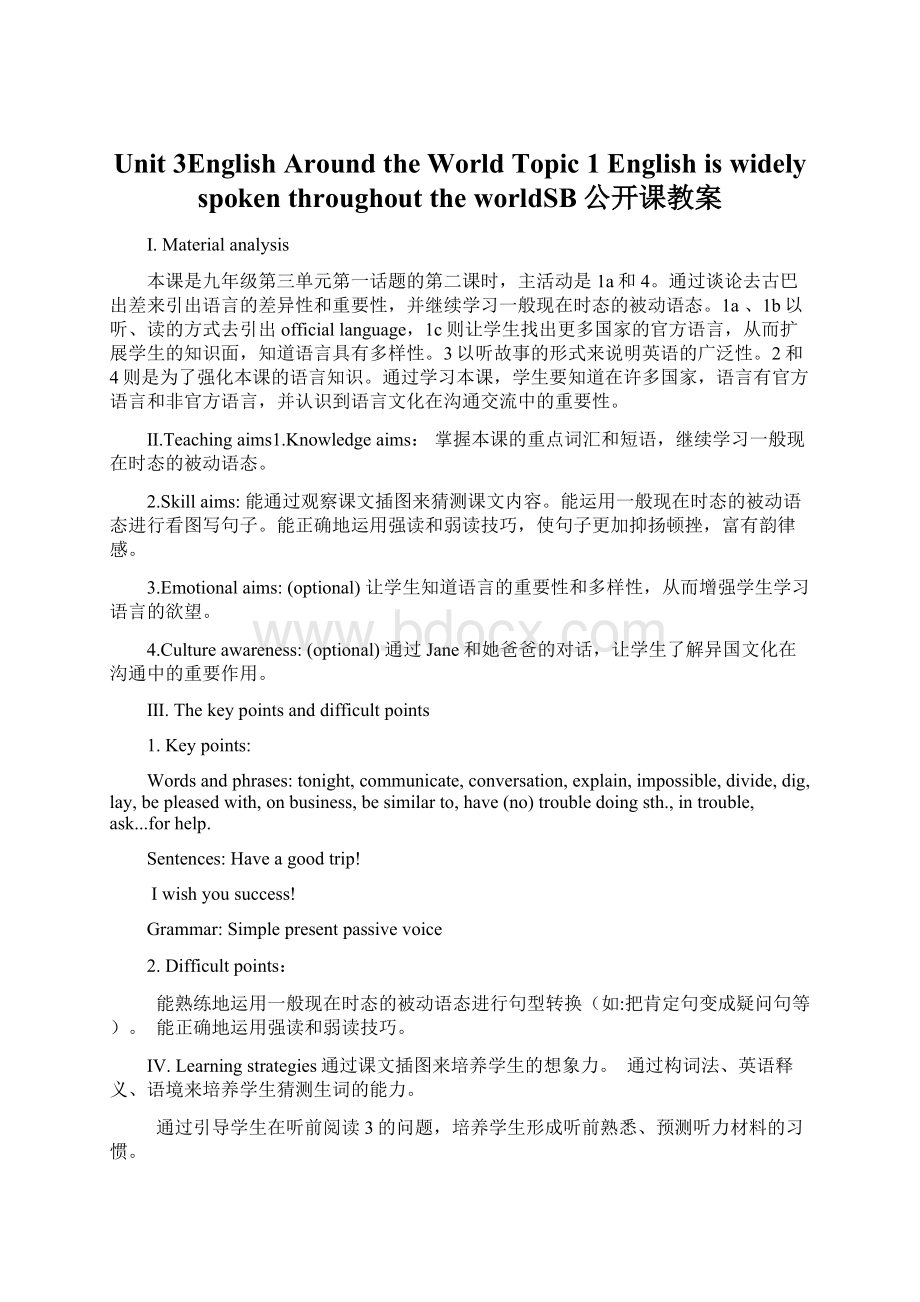Unit 3English Around the World Topic 1 English is widely spoken throughout the worldSB公开课教案.docx
《Unit 3English Around the World Topic 1 English is widely spoken throughout the worldSB公开课教案.docx》由会员分享,可在线阅读,更多相关《Unit 3English Around the World Topic 1 English is widely spoken throughout the worldSB公开课教案.docx(13页珍藏版)》请在冰豆网上搜索。

Unit3EnglishAroundtheWorldTopic1EnglishiswidelyspokenthroughouttheworldSB公开课教案
Ⅰ.Materialanalysis
本课是九年级第三单元第一话题的第二课时,主活动是1a和4。
通过谈论去古巴出差来引出语言的差异性和重要性,并继续学习一般现在时态的被动语态。
1a、1b以听、读的方式去引出officiallanguage,1c则让学生找出更多国家的官方语言,从而扩展学生的知识面,知道语言具有多样性。
3以听故事的形式来说明英语的广泛性。
2和4则是为了强化本课的语言知识。
通过学习本课,学生要知道在许多国家,语言有官方语言和非官方语言,并认识到语言文化在沟通交流中的重要性。
Ⅱ.Teachingaims1.Knowledgeaims:
掌握本课的重点词汇和短语,继续学习一般现在时态的被动语态。
2.Skillaims:
能通过观察课文插图来猜测课文内容。
能运用一般现在时态的被动语态进行看图写句子。
能正确地运用强读和弱读技巧,使句子更加抑扬顿挫,富有韵律感。
3.Emotionalaims:
(optional)让学生知道语言的重要性和多样性,从而增强学生学习语言的欲望。
4.Cultureawareness:
(optional)通过Jane和她爸爸的对话,让学生了解异国文化在沟通中的重要作用。
Ⅲ.Thekeypointsanddifficultpoints
1.Keypoints:
Wordsandphrases:
tonight,communicate,conversation,explain,impossible,divide,dig,lay,bepleasedwith,onbusiness,besimilarto,have(no)troubledoingsth.,introuble,ask...forhelp.
Sentences:
Haveagoodtrip!
Iwishyousuccess!
Grammar:
Simplepresentpassivevoice
2.Difficultpoints:
能熟练地运用一般现在时态的被动语态进行句型转换(如:
把肯定句变成疑问句等)。
能正确地运用强读和弱读技巧。
Ⅳ.Learningstrategies通过课文插图来培养学生的想象力。
通过构词法、英语释义、语境来培养学生猜测生词的能力。
通过引导学生在听前阅读3的问题,培养学生形成听前熟悉、预测听力材料的习惯。
Ⅴ.Teachingaids联合国总部和潘基文的图片,日文的药品说明书/录音机/幻灯片等。
Ⅵ.Teachingprocedures
Stage
(timeperiod)
Interaction
patterns
Teacheractivity
Studentactivity
Remarks
1
Gettingstudentsreadyforlearning
(2mins)
Classactivity
PresentapictureoftheUNheadquarterorapictureofPanJiwen.DiscussingroupsandlisttheofficiallanguagesusedinUN.Encouragethestudentstospeakthemout.
T:
Doyouknowwhatthisis?
T:
Whoishe?
T:
Great!
DoyouknowwhatlanguagesareusedintheUN?
NowdiscussingroupsandtrytonametheofficiallanguagesusedinUN.
Discussandspeakoutthelanguages.
S1:
It’stheUN.
S2:
PanJiwen.
S3:
English.
S4:
Russia.
S5:
Chinese.
S6:
...
老师可以把多种语言的名词通过小黑板或者屏幕准备好,以降低难度。
最后老师一定要给出正确的答案并教读:
Chinese,English,French,Russia,SpanishandArabic.
2
Revision
(5mins)
Groupwork
Individualwork
Step1:
LettheSslookatthepicturesin4onpage58.First,guessthemeaningsandpronunciationsof“divide,dig,lay”.Second,makeasentencewiththegivenwordsonpaper.Third,encouragegroupstowriteoneoftheirsentencesontheBb.Finally,lettheSscheckthesentences.
T:
Lookatthepicturesandguessthemeaningsandpronunciationsof“divide,dig,lay”.ThenmakeasentencewiththemonpaperandI’dlikeseveralstudentstowriteoneofyourgroup’ssentencesontheBb.
T:
Nowcheckyoursentences.
Step2:
LettheSsreadthesentencestheyhavejustwritten.Payattentiontothestressandweakform.
T:
Lookattheexamplefirst,andthenI’dlikesomestudentstoreadthesesentences.Payattentiontothestressandweakform.
Guessthemeaningsandpronunciationsofthenewwords.
S1:
Thecakeisdividedintopiecesbyher.
S2:
Thecarrotsaredugbytherabbit.
S3:
…
Readthesentencesaccordingtothegivenexample.
S1:
The`cakeis`dividedinto`piecesbyher.
S2:
The`carrotsare`dugbytherabbit.
S3:
...
先让学生根据图片猜词意,然后借助词汇表读出来。
学生可能会弄错dig,lay的过去分词,老师要及时纠正并强调。
尤其是lie和lay的过去式与过去分词。
先让学生观察例句,总结出哪些词应该强读,哪些词应该弱读。
3
Pre-listening
(7mins)
Classactivity
Classactivity
Individualwork
Step1:
PresentamedicineinstructioninJapanese.LettheSsguesswhatitisabout.Moveto1a.
T:
Hereisaninstruction.Lookatitcarefullyandguesswhatitisabout.
S1:
It’saboutmedicine.
T:
Wow!
Youaresosmart!
Howdoyouknowit?
T:
Whatdoesthismean?
T:
Youareveryclever.Asweknow,JapaneseisborrowedfromChinese.SoJapaneseissimilartoChineseinsomeway.
Step2:
LettheSslookatthepicturein1aandpredictbyansweringtheteachersquestions.
T:
Lookatthepicturein1a,whatisthemandoing?
Ss:
Heis....(writedown“pack-packing”ontheBbandteachthem.LettheSsrepeat“Heispacking”)
T:
Whatishegoingtodo?
Guess!
Step3:
LettheSsscanthestatementsin1btogetmoreusefulinformation.Writedown“possible-impossible,interpreter,tonight,onbusiness”andencouragetheSstoreadandguessthemeaning.
T:
Now,read1b,youmayfindsomeusefulinformationaboutmyquestions.PayattentiontothewordsandphrasesontheBb.
Lookattheinstructionandtrytofigureoutwhatitisabout.
S1:
BecausesomewordslooklikeChinese.
S2:
ItmeansJapanesehasthesamecharactersasChinese.
S3:
ItmeansJapaneseisborrowedfromChinese.
Lookatthepicturein1aandanswertheteacher’squestions.
S1:
Heisputtingawayhisclothes.
S2:
Heisgoingtohaveagoodtrip.
S3:
Heisgoingto...
老师要及时总结学生的猜测并指出日语是以汉语为基础创造的。
在黑板上板书词组“besimilarto”并进行教读。
合理利用旧单词,通过前缀或后缀来进行词汇教学,帮助学生通过掌握这种方法来扫除阅读障碍。
如:
impossible。
对于新单词,也可以用简单的英语进行解释,然后让学生用相应的汉语进行表述。
如:
tonight=onthenightoftoday。
还可以通过上下文的语境来猜测词义。
如:
1b中的interpreter就可以通过上下文来猜测。
4
While-listening
(4mins)
Individualwork
LettheSslistento1aonceandmarkT/Fin1b.Thenchecktheanswerstogether.
Listento1amarkT/Fin1bandcheckiftheiranswersareright.
不要担心学生不能完全听懂,只要了解大意即可。
5
Post-listening
(17mins)
Individualwork
Classactivity
Groupwork
Groupwork
Pairwork
Step1:
LettheSsread1acarefullyandcirclethedifficultpointsincludingwords,phrasesandsentences.GoaroundtheclassandcollectwhattheSshavecircledandwritethemdownontheBb.ThenencouragetheSstoreadthemandguessthemeanings.
T:
First,read1aandfindthedifficultpoints
T:
Howdoyoupronouncethisword,...?
S1:
...
T:
Whatdoesthiswordmean?
S2:
...
Step2:
LettheSsread1ainrolestocheckiftheycanpronounceproperly.Takenotesandcorrectthemafterreading.
T:
Now,girlswillbeJaneandboyswillbeFather.Read1ainroles.
Step3:
LettheSsdiscussingroupsandmakealistofthekeypoints.WritethemdownontheBb.
T:
Now,workingroups.It’stimeforyoutodecidewhichwords,phrasesorsentencesareusefultoyou.
Step4:
ChecktheSs’HMKassignedyesterday.Encouragesomegroupstomakeanewconversationbasedon1a.
T:
Now,let’scheckyourhomework.Whichgroup?
Volunteers!
Youmanybeginlikethis“ChineseisspokenastheofficiallanguageinChina.
Step5:
AsktheSstomakeanewconversationaccordingto1aafterclass.
T:
Wedon’thaveenoughtimetodaytomakeanewconversation,soyou’dbetterdoitwithyourpartnerafterclass.
Read1a,findthedifficultpointsandtrytosolvethemwiththehelpofallkindsofresources.
Read1ainrolesaloud.
Discussandmakethelistandreporttotheclass.
S1:
onbusiness,besimilarto,havetroubledoingsth.....
S2:
conversation,haveaconversation,asksbforhelp,…
S3:
explaintosb,haveagoodtrip,
Iwishyousuccess,…
S4:
communicate,pack,...
Chooseamembertoreport.
S1:
FrenchisspokenastheofficiallanguageinFrance.
S2:
Japaneseis....inJapan.
S3:
Englishis...inSingapore.
S4:
...
到了三年级,大部分学生应该具备借助词汇表来拼读单词的能力。
老师只要适时纠正即可。
让学生自己总结重点单词,词组和句子。
老师对学生没有提到的或者说得不完整的要进行补充。
如:
have(no)troubleindoingsth.,beintrouble/getintotrouble,explainsthtosb,wishsbsth.等。
老师对学生的答案要做出肯定的评价,如果学生的答案有偏差,老师要给出正确答案。
6
Finishingtask2(2mins)
Individualwork
LettheSsfillintheblanksaloneandthenchecktogether.LettheSsguesswhat“twinsister”means.
T:
Completetheblanksalone.Whenyoufinish,raiseyourhand.
Fillintheblanksandchecktheanswers.Speakouttheanswers.
当给学生布置某项单人任务时,要求学生做出回应,以便老师掌控时间和步骤。
7
Finishingtask3(3mins)
Individualwork
LettheSsscanthequestionsquickly.ThenlettheSslistentothetape.Askthemtopayattentiontothemostimportantpart.
T:
Now,youwilllistentoastoryaboutMary.Trytocatchtheanswerstothequestions.
Readthequestions.Listentothetapeandchecktheanswers.
S1:
Maryisa/an....
S2:
BecauseMary...
S3:
...
8
Summarizingandassigninghomework
(5mins)
Classactivity
Step1:
LettheSsgothroughwhattheyhavelearnedinthisperiod.Speakoutwhattheyhavelearned.
T:
Now,let’ssumupwhatwehavelearnedtoday.Youcanspeakoutthewords,phrases,sentences.Andsoon.
Step2:
HMK:
T:
Makeanewconversationbasedon1conpage57withyourpartneraccordingto1a.
Sumupandspeakonebyone.
S1:
onbusiness,explainsth.tosb...
S2:
havetroubledoingsth..,introuble,getintotrouble,...
Ⅶ.Blackboarddesign
Englishiswidelyspokenthroughouttheworld.
SectionB
Wordsandphrases:
Grammar:
Sentences:
SpanishIsEnglishspokenastheofficiallanguage?
Notreally.
divide(一般疑问形式)Oh,Isee.
divideintoHaveagoodtrip.
lie-lay-lainIwishyousuccess.
lay-laid-laid
dig-dug-dug
besimilarto
pack
possible-impossible
tonight
onbusiness
interpreter
communication-communicate